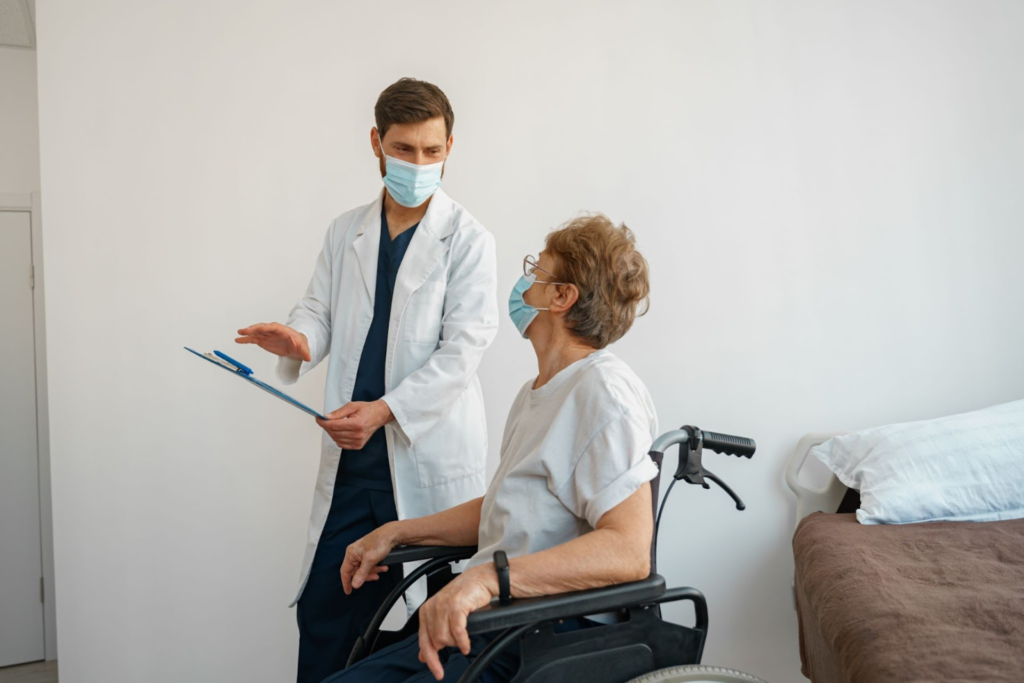While the temporary effects of sleep apnea can lead to poor sleep, untreated sleep apnea can lead to diabetes, hypertension, and even cancer.
If this is a worry of yours, you’re not alone— about 22 million Americans experience sleep apnea each year.
We’ve talked about how obstructive sleep apnea can leave you feeling fatigued and foggy, but can the long-term effects contribute to cancer?
There is no single cause for cancer. It can be caused by genetic or environmental risk factors and exposure to certain chemicals. More research is needed to know the direct cause, but the link between sleep apnea and cancer is undeniable.
Before we examine that, let’s first look at what makes sleep apnea so serious.
What is Sleep Apnea?
If you’re reading this article, chances are you already know what sleep apnea is to a certain extent. We’ll just go over the basics here, but if you want to learn more about sleep apnea, check out some of our other articles on the Sleep Centers of Middle Tennessee blog.
Sleep apnea is a serious sleep disorder where you experience breathing interruptions several times during the night. There are three main types of sleep apnea:
- Obstructive sleep apnea (OSA). The most common form of sleep apnea, OSA is caused by a blockage in your airway while you sleep.
- Central sleep apnea (CSA). This form of sleep apnea is not caused by any blocked airways. Instead, it’s caused by your brain not sending the correct signals to your breathing muscles while you sleep.
- Mixed sleep apnea. Also known as complex sleep apnea, this is the rarest form of sleep apnea. It’s a combination of both OSA and CSA.
Most breathing interruptions are not apneas— complete obstruction of your airways. Instead, they’re hypopneas— or interruptions caused by partially blocked airways. Regardless of the type of interruption, people with sleep apnea can experience as few as five breathing interruptions per hour. In comparison, those with severe obstructive sleep apnea can experience up to 100 breathing interruptions per hour!
Common signs that you may have sleep apnea include:
- Loud snoring
- Disrupted sleep
- Choking or gasping during the night
- Daytime sleepiness
- Brain fog
- Feeling tired or exhausted, even after a full night’s sleep
The Dangers of Sleep Apnea
Left untreated, sleep apnea can wreak havoc on your health, causing or worsening health problems including, but not limited to:
- Diabetes
- Hypertension (High Blood Pressure)
- Cardiovascular Disease
- Acid Reflux or GERD
- Erectile dysfunction
- Obesity
- Alzheimer’s Disease
To make matters worse, according to the Cleveland Clinic, 80 to 90 percent of people with sleep apnea don’t even know they have it. Unfortunately, untreated sleep apnea will not go away on its own, and it will only get worse the longer it stays untreated.
The longer sleep apnea goes without being treated, the higher your risks are for developing more serious health problems like those listed above. In fact, if left untreated, sleep apnea may even increase your risk of developing cancer.
The Connection Between Sleep Apnea and Cancer Risk
Approximately 1.9 million people are diagnosed with cancer yearly in the United States. A growing body of evidence shows that sleep apnea contributes to cancer risk.
A recent meta-analysis of 22 articles about the relationship between sleep apnea and cancer found a high prevalence of obstructive sleep apnea in cancer patients. The analysis also found that OSA patients were more likely to develop tumors directly related to their OSA severity. [1]
This increased risk for cancer was connected to known risk factors for obstructive sleep apnea, including:
- Age— middle-aged adults and seniors are at an increased risk for obstructive sleep apnea
- Body mass index (BMI)— being overweight or obese is one of the main risk factors for obstructive sleep apnea. Any additional body weight puts pressure on your airways and contributes to sleep-disordered breathing.
- Smoking— smoking inflames and irritates your airways and reduces your airflow.
According to research from the Spanish Sleep Network, people with severe OSA had a 65 percent higher risk of cancer than those who do not.
Compared to the general population, people were at a higher risk of certain cancers, including melanoma, kidney, breast, and uterine cancer. There is an increased risk for lung cancer and colorectal cancer, but these risks are lower than the latter examples.
One study by the Wisconsin Sleep Cohort found that patients with sleep-disordered breathing are five times more likely to die from cancer than those without sleep apnea.
How Are Sleep Apnea And Cancer Linked?
Experts aren’t sure what the link between sleep apnea and cancer risk is, but there are a few theories.
The first is that frequent sleep disruptions may cause oxidative stress on your body. This stresses your body on a cellular level— leading to increased inflammation in your body and potentially increasing your cancer risk in the process.
A study from the University of Washington Sleep Center also found some interesting results. Using animal and in vitro models, researchers found that controlled exposure to sleep apnea symptoms, like periods of low oxygen and sleep fragmentation, can trigger stress responses in the body. This stress on the body caused by sleep apnea symptoms may potentially encourage the growth of tumors or cancerous cells. [3]
In fact, other facets of sleep apnea may support tumor growth— the main culprit likely being low oxygen from breathing obstruction. Another theory is that this risk is associated with the low oxygen caused by the hypoxia itself.
How Can Sleep Apnea Support Tumor Growth?
The theory is that airway obstruction may promote a process called neovascularization. This process encourages the growth of new blood vessels in your body— it may also promote tumor growth.
One other potential risk factor may make you more vulnerable to cancer if you have sleep apnea— and it’s not something you’d expect.
Obstructive Sleep Apnea And The Risks Of Oxidative Stress
Oxidation is a normal process in your body and is necessary for good health. However, oxidative stress occurs when free radicals overwhelm your body’s antioxidant defenses. When free radicals outnumber antioxidants in your body, they can cause a number of health conditions and diseases. Some of these include:
- Diabetes
- Hypertension
- Heart disease
- Alzheimer’s Disease
- Cancer
Sound familiar? That’s because sleep apnea can contribute to or even worsen these same conditions because of the oxidative stress it causes in your body.
Remember, sleep disruptions cause oxidative stress in your body. In particular, intermittent hypoxia (periods of low oxygen) can contribute to oxidative stress. Fragmented sleep also may contribute to or accelerate tumor growth.
How Can My Lifestyle Affect Sleep Apnea And Cancer Diagnosis?
While many people have been diagnosed with sleep apnea or cancer for reasons beyond their control, you may notice the root causes of the two often overlap.
Lifestyle factors such as smoking, unhealthy diets, and alcohol abuse greatly increase your chances of being diagnosed with both sleep apnea and cancer. Sleep apnea may be a contributing factor to cancer, but both can often be a consequence of a lifetime of personal choices that are detrimental to your health.
The bottom line is an unhealthy lifestyle can have a lasting impact that goes beyond a sleepless night or a coughing fit. Conscientious decision-making and proper care of your body can go a long way to limiting serious illnesses that may otherwise be preventable.
A healthy diet, proper exercise, and smoke-free lungs are obvious prevention methods, but seeking diagnosis and treatment for undiagnosed disorders like sleep apnea cannot be overlooked. By reaching out to sleep experts to conduct a sleep study, doctors can properly diagnose your form of sleep apnea and offer treatment.
How Do You Treat Obstructive Sleep Apnea?
Before you can treat obstructive sleep apnea, you have to get tested for the disorder. This can be done with a sleep study.
A sleep study is conducted while you sleep and will examine and diagnose any patterns causing your sleep problems. A sleep study monitors your breathing, brain, and muscle activity. This means it can determine how quickly you fall asleep, your brain activity while you’re asleep, and even your OSA severity by monitoring how many times you stop breathing each hour.
While many cases of sleep apnea can be diagnosed using a home sleep test, more complicated cases require an in-lab sleep study.
Once you’ve completed a sleep study, the best way to treat obstructive sleep apnea is CPAP therapy. CPAP— continuous positive airway pressure— provides a constant stream of air that gently opens your airways, preventing collapse and allowing you to sleep and breathe normally throughout the night.
Even though it helps you breathe, the CPAP device isn’t a ventilator. However, these sleep apnea machines are the key to treating the sleep disorder, helping you get the sleep you deserve, and even reducing your risk of developing cancer.
For CPAP therapy to help you, you must use it correctly and consistently. It may not be an easy routine to get into, but you’ll feel so much better in the morning when you do.
Don’t Sleep on Your Apnea Symptoms
It’s not always easy to tell if you’re experiencing sleep apnea symptoms— that’s why it’s such an underdiagnosed sleep disorder.
If you think that you or your sleep partner may have undiagnosed sleep apnea, then it’s crucial to schedule a sleep study as soon as possible. Identifying the sources of your sleep issues via a sleep study is the first step toward treatment and improving your sleep and overall health.
By addressing your sleep apnea early, you can treat the issue and limit your chances of developing long-term health issues associated with untreated OSA.
If you’re unsure if you have a sleep disorder like obstructive sleep apnea, a good night’s sleep may just be a sleep study away. Contact us at the Sleep Centers of Middle Tennessee today! We can help you schedule an evaluation of your symptoms and start getting back to the healthy sleep you need.
References
1. Cao, Yuan, et al. “Cancer and Obstructive Sleep Apnea: An Updated Meta-Analysis: Medicine.” LWW, Medicine, 11 Mar. 2022, journals.lww.com/md-journal/Fulltext/2022/03110/Cancer_and_obstructive_sleep_apnea__An_updated.9.aspx.
2. Pataka, Athanasia, et al. “Cancer Prevalence Is Increased in Females with Sleep Apnoea: Data from the ESADA Study.” European Respiratory Society, European Respiratory Society, 1 June 2019, erj.ersjournals.com/content/53/6/1900091.
3. Sillah, Arthur, et al. “Obstructive Sleep Apnea Severity and Subsequent Risk for Cancer Incidence.” Preventive Medicine Reports, Elsevier, 2 May 2019, www.ncbi.nlm.nih.gov/pmc/articles/PMC6525275/.








